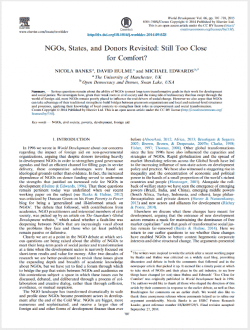
Policy highlights:
- In recent years, questions have been raised about the ability of NGOs to meet long-term goals of social justice and transformation. Instead their focus seems to be on short-term results and value for money. ‘Service delivery functions’ have priority over ‘civil society functions’. The authors of this article argue this can be explained by the differences between intermediary NGOs and membership-based civil society organizations (MBOs). As opposed to professionalized NGOs, MBOs can respond to the needs and aspirations of their members, because they are accountable, both inwardly (leaders are elected) and outwardly (leaders represent their constituencies).
- For NGOs, two factors have been traditionally identified as strengths: 1) their connection to the grassroots level and 2) their ability to innovate. However, the need to act in accordance with the rules of the ‘development marketplace’ means that NGOs are closer in kind to socially-responsible market actors than to civil society organizations.
- Connections with the grassroots level have been decreased due to the fact that NGOs tend to: 1) favour operational efficiency and policy influence (e.g. as the Zapatista movement in Mexico demanded greater participation, some NGOs dropped out of their support role as they could not find funding for these changing priorities), 2) base their geographic location on donor presence, 3) prioritize service delivery functions in favour of donors, 4) favour accountability and ‘measurable results’ over empowerment, 5) engage in partnerships with states (acting non-politically and requiring more professionalization), and 7) fail to change underlying structures and processes, even when performing civil society functions.
- Innovation by NGOs has decreased due to: 1) early criticism of the limited impact of NGO activities, which led to a focus on ‘scaling-up’, capacity-building and partnerships, 2) risk-averseness among donors (funds are channelled predominantly through large, formal NGOs that are rarely innovative), and 3) donor expectations and their demands for measurable outcomes in pre-specified time frames.
- Their ability to build links, coordinate between sectors, and apply their knowledge of local contexts mean that NGOs could strengthen their role, even as service delivery functions decline. NGOs should also rethink their function as bridging organizations in the ‘development ecosystem’ and: 1) release control; become supporters and facilitators, 2) link grassroots activities with development finance and broader advocacy struggles, 3) recognize the political economy of social change, and align with the political programmes of social movements or development states.
- If NGOs remain ‘too close for comfort’ they are unlikely to respond creatively to this challenge. However, by distancing themselves from their dependence on governments and donors they could become partners in the transformation of society.






